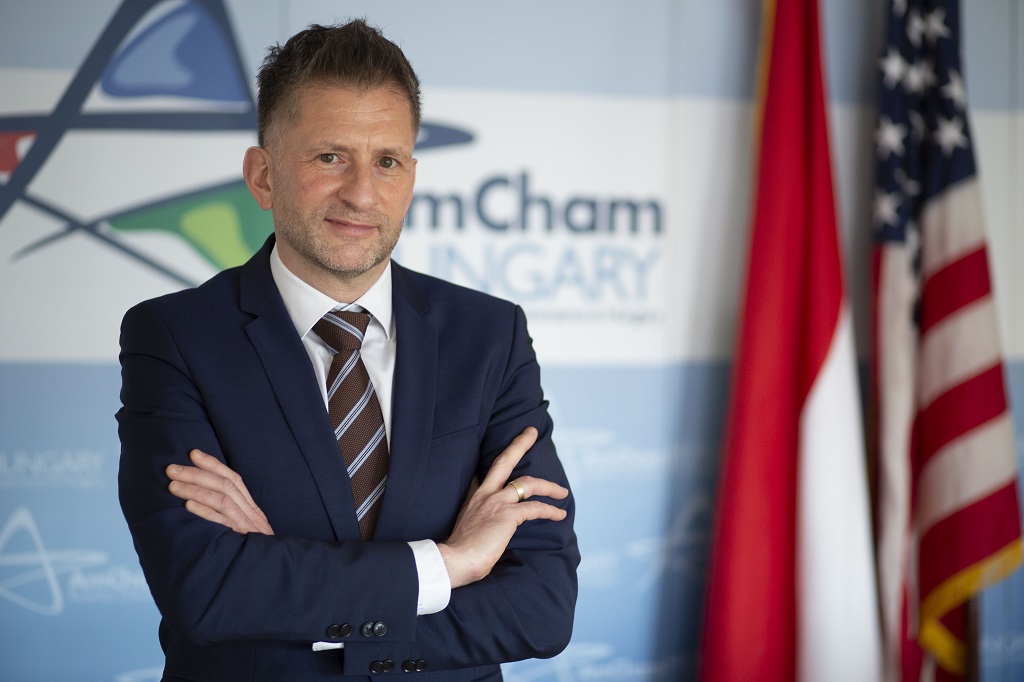Because the American dream is based on hard work, the American Chamber of Commerce, an advocacy organization founded in 1989, is committed to the success of American companies operating in Hungary. Zoltán Szabó, President of AmCham, stresses that a healthy business environment and strengthening competitiveness is not only in the interest of American companies, but also a key to the advancement of the Hungarian economy as a whole.
According to the President of AmCham, 2021 will mark a milestone in the cooperation between the two countries, as this year marks the centenary of the establishment of US-Hungarian diplomatic relations. In this context, the presence of US companies in Hungary has a long history, but the real breakthrough came after the Soviet era, when US companies played a key role in the creation of the market economy. Not only by investing heavily and creating jobs, but also by introducing new technologies, and creating a new corporate culture that greatly enhanced the competitiveness of companies and the Hungarian economy. The American Chamber of Commerce in Hungary (AmCham, founded in 1989) as one of the largest American advocacy organizations in the region with more than 300 members has played an important role in this work.
“The main characteristics of the American business culture are cost-efficiency result-orientation, transparency, i.e., diversity”, says the President of AmCham. He added: “The Chamber’s members are not only American companies, but multinational companies with other roots, and a large number of Hungarian companies in all size are also represented.
The most important element of the organization’s mission is to represent the interests of its members and, in this context, to increase Hungary’s competitiveness.
“Our Chamber is declared to be a non-political organisation, which always works closely with the current government to represent the interests of our members and to improve the competitiveness of the Hungarian economy. Every February , we send yearly action plan of our strategy, to the Prime Minister’s Office and all the ministers, state secretaries and deputy state secretaries concerned. This is the start of the professional discussion, where the representatives of our working groups, alongside the chamber’s leaders, present their proposals and the arguments behind them,” he says.
As he explained that AmCham’s five-year strategy is based on three pillars.
“The first is smartgrowth, the second is human capital and the third is the concept of creating a healthy, competitive business environment. With regard to the first pillar, smart growth, it is important to underline that its cornerstone is true digitalisation, as it is an essential element to increase competitiveness, stimulate the development of high value-added industries and boost our country’s innovation capacity. It is true that there is a lot of talk about the subject at the level of slogans, but in terms of indicators of digital transformation we are not doing well at all.
We could say that we are already over the worst, because the basic infrastructure in Hungary, such as 4G and 5G mobile and high-speed fixed networks, is very well developed, even compared to developed countries. But beyond that, we are lagging behind in terms of digitisation of processes, security of services and the change of mindset that is essential for the deployment of new technology. One of the conditions for overcoming our disadvantage is to improve our research and development (R&D) capabilities, where we are lagging far behind not only the US or China, but even Europe. That is why AmCham is working hard to help Hungary to make progress in R&D. Most importantly, by enabling universities to become more effectively involved in solving business problems in the field of applied research.”
Lobbying independently Founded in 1989, the American Chamber of Commerce in Hungary is an autonomous, politically and financially independent advocacy organization that receives no funding from either the Hungarian or US governments. It operates in the interests of its entire membership, in addition to American companies coming to and operating in Hungary, and is supported by membership fees and the funds it raises from activities organised by its members. The Hungarian AmCham is loosely connected to AmChams active in the world and especially in Europe, which means primarily joint professional activities and the organisation of events.
According to the expert, the issue of increasing productivity is at least as much a problem for the SME sector as it is for large companies. Key productivity indicators of Hungarian SMEs lag behind not only the EU average but even the V4 in most sectors. According to the AmCham president, the US work organisation can also be a guide in this area, with a focus on high value-added activities, increasing efficiency and profitability.
“The second pillar of our strategy is the issue of human capital. If you consider that Hungary has an unemployment rate of around four percent, that is a respectable figure by international standards, it means almost full employment. However, if we want to maintain the country’s competitiveness while wages in Hungary continue to rise, we clearly need to invest in, or attract investors to, sectors with higher added value and thus higher profitability.
However, a system of tax incentives is not enough: we also need skilled human capital, i.e. high-quality education . This means much more than good quality vocational training, which is of course the basis. But high value-added companies are also looking for people who can reason effectively, speak several languages, work in teams and solve complex problems, which is essential to catch up Hungarian education. A key issue, for example, is to start preparing for business not only in higher education, but also in primary school, with appropriate language teaching and by learning reasoning and negotiation techniques.”
Turning to the issue of human capital, the expert said that improving the quality of health care is also inevitable. He argues that the number of years spent in good health in Austria is up to 10 years higher than in Hungary. This is an important indicator not only for quality of life but also for productivity. Good news that Western companies are no longer looking only for young workers, the employability of middle-aged and older people is often called into question by their health condition. It t is important to have a 180 degree shift in attitude towards health prevention, which is also promoting a more health-conscious lifestyle among Hungarians.
Beside all above there is also a need to develop supportive labour market legislation to provide a legal framework for atypical forms of employment, which are particularly prevalent in times of covid epidemics. This is a real need. For example, with the emergence of internal service centres linked to international companies, more and more jobs have been created where there is a strong demand for young mothers to return to work 20 hours a week. In addition, it is also essential that they can work from home, because their physical presence is not necessarily needed, but their skills are.
The third pillar of our strategy is the business environment. The focus here is on a competitive tax system and a supportive regulatory environment, which are essential to increase the competitiveness of the Hungarian economy. In this context, we are looking at how to help modernise the domestic SME sector and thereby reduce the current regional disadvantage. We will also look at how we can help the large corporate sector to attract more investment to our country, creating more and better quality jobs. I am pleased to say that while we have had successes in other areas, we have developed a very active and effective cooperation between the Ministry of Finance and the members of our tax group, based on mutual trust and receptiveness,” argues Zoltán Szabó.
He stressed that government consultations have not stopped during the epidemic period: initially they held weekly, now bi-weekly consultations on the challenges of the epidemic and possible directions for economic recovery. The quality of the work of the AmCham’s teams of experts, delegated by its members, has been approved by the government, which has already accepted and incorporated several of their proposals into the legislation.
“What I am most proud of over the past period is the way we have maintained our operations and our ability to respond to the very rapidly changing situation, even in the difficult times created by the epidemic. We have also been able to remain independent, true to our principles. All of this while the American Chamber of Commerce remains one of the most influential chambers of commerce in Hungary, and it’s opinion is more and more listened on economic issues. Because what we say has value, and our opinions are backed by professional work and a large corporate base that is worth listening to,” he says.
In addition to all this, AmCham has also spent some time for developing the organisation itself focusing on measurability which is 100% in line with Zoltán Szabó’s leadership principles. As a result of this Amcham is able respond effectively to problems that arise without mobilising the whole organisation, butonly by addressing the issues to a team of experts in the field and the 20 to 30 companies associated with it.
This has also contributed to the growth in AmCham’s effectiveness and, by extension, its prestige, as demonstrated by the fact that its membership has continued to grow despite the epidemic period.
Zoltán M. Érsek









